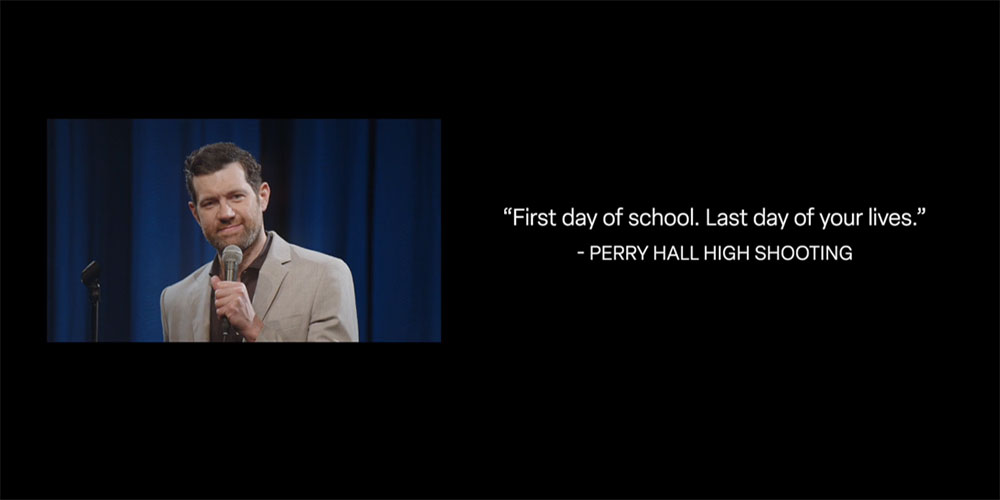Each year, Sandy Hook Promise releases a profound, chilling, and impactful PSA about the importance of speaking up when concerning behavior is exhibited — even if you think they might be “joking.”
In this year’s PSA, the non-profit group, founded by family members of Sandy Hook victims, enlisted nine well-known comedians to deliver real threats made by school shooters to audiences who think they’re hearing a set-up for a joke.
“First day of school, last day of your lives,” Billy Eichner opens as the audience chuckles.
“Some sh*t’s gonna go down and I don’t think you’re gonna like it,” Wanda Sykes follows.
“Here’s the thing — I am going to kill all of you.”
“I want to kill people.”
“Bang, bang, you’re dead.”
“I set the date. You are gonna regret not talking to me. You have no idea what I’m talking about but you will.”
“Please talk me out of this — the gun is in my hand,” says Caitlin Reilly as the audience’s laughter and cheers dissipate.
“Hey, fair warning. Stay home tomorrow if you want to live.”
“Today is the day my massacre begins.”
“Some of you guys are alright. Don’t go to school tomorrow. I mean it.”
“Seriously. I’m going to shoot up an elementary school right now.”
“After all the name-calling, I want to go down as the best school shooter in history.”
The PSA then says the comics’ lines were real threats made by school shooters but “everyone thought they were joking.”
“They weren’t joking,” the PSA concludes. “If you see a sign, always say something.”
10 Critical Warning Signs of Violence
While not all people who become violent exhibit all of these, there are common signs often exhibited by a person who may be in crisis or in need of help. According to Sandy Hook Promise, those signs include:
- Suddenly withdrawing from friends, family, and activities (including online or via social media)
- Bullying, especially if targeted toward differences in race, religion, gender, or sexual orientation
- Excessive irritability, lack of patience, or becoming angry quickly
- Experiencing chronic loneliness or social isolation
- Expressing persistent thoughts of harming themselves or someone else
- Making direct threats toward a place, another person, or themselves
- Bragging about access to guns or weapons
- Recruiting accomplices or audiences for an attack
- Directly expressing a threat as a plan
- Cruelty to animals
Proof ‘See Something, Say Something’ Works
A 2021 study from the U.S. Secret Service looked at 67 disrupted targeted school-based violence plots against K-12 schools from 2006 to 2018 to determine best practices for school violence prevention. The report found that 94% of plotters shared their intention to carry out an attack, including verbal statements, electronic messaging, and online posts. In about two-fifths of the cases, plotters also documented their intentions in journals, documents, videos, and audio recordings that were not shared with others prior to plot discovery.
According to the Secret Service, the key findings of its study are clear and consistent: “Individuals contemplating violence often exhibit observable behaviors, and when community members report these behaviors, the next tragedy can be averted.”
The importance of seeing something and saying something cannot be emphasized enough among students, staff, and entire communities. Whether it is members of the public communicating with law enforcement or students communicating with school administration, providing a safe space for community members to report concerns is essential to preventing incidents. Schools should ensure students have a method for anonymously reporting concerns they may be reluctant to share with adults for whatever reason, including fear of retaliation or rejection.
And it’s not just for preventing school shootings or other targeted violence. In fact, tip lines receive far more reports of suicidal students than school violence. Reporting bullying, suicidal ideations, or drug use can save lives and connect people with resources before they consider hurting themselves or others.
While reporting programs are a critical tool in preventing targeted school violence, they are only effective if members of the school community utilize them. To help K-12 schools improve and encourage reporting, the Cybersecurity and Infrastructure Security Agency’s (CISA) School Safety Task Force and the USSS NTAC partnered to create “Improving School Safety Through Bystander Reporting: A Toolkit for Strengthening K-12 Reporting Programs.” The K-12 Bystander Reporting Toolkit provides simple, evidence-based strategies and guidance that K-12 schools and districts can use to implement and enhance safety reporting programs and create a school environment where students are more willing and able to report their concerns.
Here are additional resources on the importance of reporting programs and ways schools can bolster these programs:
- 5 Ways Schools Can Encourage Students to Report Threats
- Tabletop Exercise 9: Anonymous Tip Says Student Plans to Bring Weapon to School
- Why Your School’s Anonymous Tip Line Needs to Have a Texting Option
- Protect Your Campus: How You Can Help Recognize and Report Suspicious Activity
- Michigan OK2SAY Student Tip Line Saw 67% Increase Last Year
For more articles on anonymous tip lines, visit campussafetymagazine.com/tag/anonymoustips.













